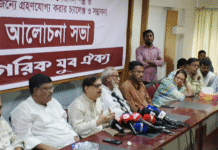
Mirza Fakhrul Islam Alamgir
The secretary general of the country’s principal opposition political party Bangladesh Nationalist Party (BNP), Mirza Fakhrul Islam Alamgir, has talked at length about the Rohingya crisis in an interview with Prothom Alo. Over half a million Muslim Rohingyas have come into Bangladesh fleeing persecution by security forces in Myanmar’s northern Rakhine state. The United Nations has called the persecution a “textbook example of ethnic cleansing”.
Prothom Alo’s Mashiul Alam did the interview.
Prothom Alo: How does the BNP view the Rohingya crisis?
Mirza Fakhrul Islam Alamgir: We organised a press conference and demanded an immediate end to it. The Rohingya crisis is not of today. Rohingyas have been undergoing persecution for quite some time. In 1978, around 250,000 Rohingya people fled to Bangladesh. The then president Ziaur Rahman signed an agreement with the Myanmar government to solve the problem. Myanmar took back its nationals and promised to recognise them as Myanmar citizens. A large number of Rohingyas once again fled to Bangladesh in 1992. An agreement was made then also and Rohingyas were once again taken back, but some of them remained in Bangladesh. Rohingyas started to enter Bangladesh once again two years ago. Recently, over 500,000 Rohingyas fled to Bangladesh since 25 August.
Prothom Alo: Did our government do what it should have done to face the problem?
Mirza Fakhrul Islam Alamgir: I think the government did not attach importance to the problem at least for the first seven days. When the Rohingya people entered in their thousands, the government was unable to stop it. Leaders of different countries expressed concern. Leaders of Indonesia, Malaysia and Turkey visited Bangladesh to see the problem on the ground. The UN secretary-general sent letters to the UN Security Council to sit for a dialogue to solve the problem. Three meetings were held, but ended without any concrete decision. Unfortunately, China, India and Russia sided with the Myanmar government.
Prothom Alo: What would you say about the steps of our government?
Mirza Fakhrul Islam Alamgir: There is lacking in the steps taken by the government. The government has not yet sent any high power delegation abroad to deal with the crisis. If the government sent delegations to China, India and Russia to make them understand the problem, there would have been a united effort to solve the problem through the United Nations.
Prothom Alo: In cases of ethnic cleansing such as is going on in Myanmar, an international sanction is generally imposed on the wrong doer. Why has the demand to impose sanctions on Myanmar not been raised?
Mirza Fakhrul Islam Alamgir: On behalf of BNP, we have raised such a demand. We have asked for sanctions against Myanmar through the United Nations. There is no one to raise a strong voice against the persecution being carried out by the Myanmar government.
Prothom Alo: Couldn’t all parties in Bangladesh jointly raise their voice?
Mirza Fakhrul Islam Alamgir: From the very beginning, we have been raising a demand to forge a unity on the Rohingya issue. But the government did not pay any heed to it. Rathe,r the government is making a mockery of it. So we have to understand how much the government is truly giving importance to the problem. If the government wants to solve the problem, it has to go to the root of the problem. National unity does not mean the entire nation has to jointly seek war. By national unity we mean an ethical support to the problem. The entire nation wants a solution. The government can showcase this unity to the world. Then the world community will realise the entire community of Bangladesh is behind the government.
Prothom Alo: How can we win the support of friendly countries like China, India and Russia to stop the influx of Rohingyas and send back those who arrived in Bangladesh?
Mirza Fakhrul Islam Alamgir: Government delegations should have gone to Russia, China and India earlier. Our delegations should be questioning these countries about their perspective on the crisis. Rohingyas are fleeing to Bangladesh to escape persecution. And such atrocities should be stopped. We should have sent a special envoy to the UN. How the government views the problem is the main thing. At the outset, the government approach suggests it has not been looking at the problem rightly.
Prothom Alo: Do you think the government is now dealing with the issue properly?
Mirza Fakhrul Islam Alamgir: No, the government is still not dealing with things rightly. The government is holding meetings with the Myanmar minister in Dhaka. Does the Myanmar minister represent his state? There is no outcome from the meeting. No agreement has been signed. I said a united effort is needed to solve the problem. The government rejected the proposal of national unity I made earlier.
Prothom Alo: Can you specify the steps the government should take?
Mirza Fakhrul Islam Alamgir: The government should organise a national convention engaging all, including all political parties and civil society. Recommendations of the convention have to be circulated across the globe. The government should give all out diplomatic efforts. A delegation, including members of the opposition party, can be sent. There should be a strong representation at the UN.
Prothom Alo: Do you think Bangladesh is in a long term crisis with the Rohingyas?
Mirza Fakhrul Islam Alamgir: It is true the crisis is complex and long. When the Rohingyas start looking for work, they will not have good relations with the locals. If Rohingyas find no work, they will indulge in crimes. They may even get involved in extremism.
Prothom Alo: How will you solve it if you go to power in the future?
Mirza Fakhrul Islam Alamgir: First we will take steps to directly communicate with the Myanmar government. We will demand they stop the atrocities. A permanent solution has to be found. If the Myanmar government ignores our urging, we will go to member countries of the UNSC. We will make all out efforts to solve the problem.
Prothom Alo: Thank you.
Mirza Fakhrul Islam: Thanks.









